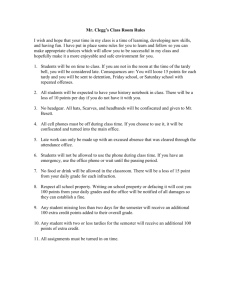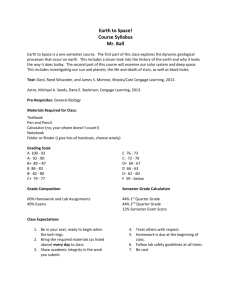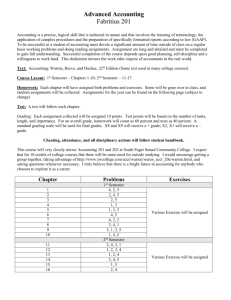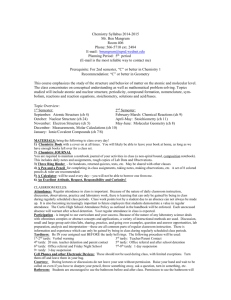Mythology Syllabus - Mr. Klements' World Lit/Mythology and
advertisement
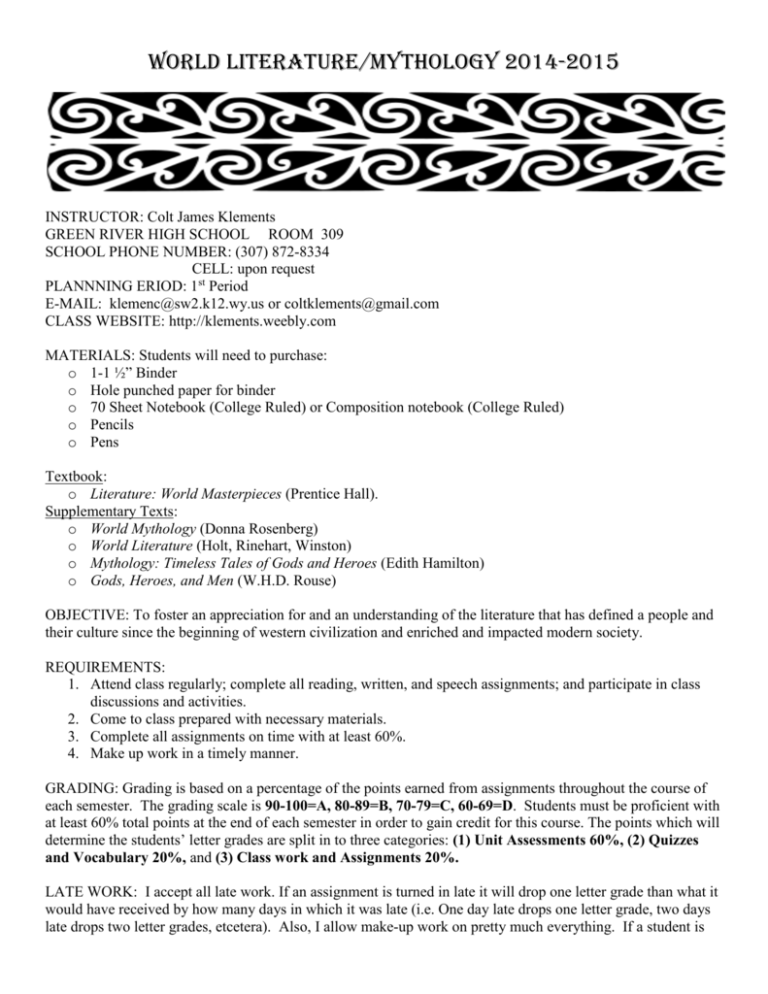
WORLD LITERATURE/MYTHOLOGY 2014-2015 INSTRUCTOR: Colt James Klements GREEN RIVER HIGH SCHOOL ROOM 309 SCHOOL PHONE NUMBER: (307) 872-8334 CELL: upon request PLANNNING ERIOD: 1st Period E-MAIL: klemenc@sw2.k12.wy.us or coltklements@gmail.com CLASS WEBSITE: http://klements.weebly.com MATERIALS: Students will need to purchase: o 1-1 ½” Binder o Hole punched paper for binder o 70 Sheet Notebook (College Ruled) or Composition notebook (College Ruled) o Pencils o Pens Textbook: o Literature: World Masterpieces (Prentice Hall). Supplementary Texts: o World Mythology (Donna Rosenberg) o World Literature (Holt, Rinehart, Winston) o Mythology: Timeless Tales of Gods and Heroes (Edith Hamilton) o Gods, Heroes, and Men (W.H.D. Rouse) OBJECTIVE: To foster an appreciation for and an understanding of the literature that has defined a people and their culture since the beginning of western civilization and enriched and impacted modern society. REQUIREMENTS: 1. Attend class regularly; complete all reading, written, and speech assignments; and participate in class discussions and activities. 2. Come to class prepared with necessary materials. 3. Complete all assignments on time with at least 60%. 4. Make up work in a timely manner. GRADING: Grading is based on a percentage of the points earned from assignments throughout the course of each semester. The grading scale is 90-100=A, 80-89=B, 70-79=C, 60-69=D. Students must be proficient with at least 60% total points at the end of each semester in order to gain credit for this course. The points which will determine the students’ letter grades are split in to three categories: (1) Unit Assessments 60%, (2) Quizzes and Vocabulary 20%, and (3) Class work and Assignments 20%. LATE WORK: I accept all late work. If an assignment is turned in late it will drop one letter grade than what it would have received by how many days in which it was late (i.e. One day late drops one letter grade, two days late drops two letter grades, etcetera). Also, I allow make-up work on pretty much everything. If a student is not pleased with the grade which they were given on a particular assignment they have every right to redo or revise that piece of work. COURSE DESCRIPION AND DIRECTION: This course moves chronologically through the literature of cultures that have influenced western societies. Both semesters address the state standards through the development of reading, writing, listening, and speaking skills. READING: First semester units include literature from the Middle East, Egypt, Greece, and Rome. o The Middle East and Egypt: The Enuma Elish, Osiris, Isis, and Horus. Telepinu, Gilgamesh, The Creation and the Flood, The Qur’an, The thousand and One Nights, and The Rubaiyat. o Greece and Rome: The Creation of the Titans and the Gods, Prometheus, The Ages of Man, Echo and Narcissus, Demeter and Persephone, The Labors and Death of Hercules, Jason and the Golden Fleece, Medea, Theseus, Perseus, The Iliad, Pyramus and Thisbe, The Aeneid, (here Dante’s Inferno) Second semester units are likely to carry over from and include literature from Greece/Rome as well as literature from Northern Europe and the Modern World. o Northern Europe: The Creation, Death, and Rebirth of the Universe, The death of Balder, The Theft of Thor’s Hammer, Sigurd the Volsung, and Beowulf. o The British Isles: The Legend of King Arthur, Sir Gawain and the Green Knight, Macbeth NOTE: This syllabus is subject to change as far as content covered during each semester. Depending on time, other literature from the above cultures plus the Far East, the Pacific Islands, Africa, and the Americas may be included. WRITING/VOCABULARY: o Vocabulary is drawn from the literature/text with a weekly test. o Formal essays for first semester include an explanatory myth and hero essay that connects ideas studied in class and crosses cultures. o Other creative writing assignments, both formal and informal, are a part of the course. o Most tests are essay based and paired with a short answer section. SPEAKING AND LISTENING: Class discussions about literature and the cultures they define are an integral part of this course. Students will also be responsible for giving a brief speech in which the speaker and the audience will be graded upon. NOTE: The State Standards of READING, WRITING, LISTENING, AND SPEAKING are addressed in both semesters. The literature is subject to change due to possible time constraints, but the skills are always addressed. METHODS OF ASSESSING STANDARDS: Students are assessed by district-approved common assessments. The assessments for World Literature/Mythology is based on the sonnet, and will be addressed second semester. Both a rubric score for the District and a class grade will be part of the assessment. Approximately 25% to 35% of the Second Semester Grade will be based on this common assessment. Mr. Klements’ RULES/CLASSROOM MANAGEMENT PLAN—2014-15 Our classroom is like a puzzle, all the pieces matter. From each and every activity, assignment, and class period to every student, opinion, and discussion. Everything, everyone, and every minute matter. As the oldest “piece” in the room, I foster and facilitate a safe and inviting classroom environment so the students are not dependent upon me to learn, but feel free and secure to do the learning themselves. And, if we’re lucky, they will be teaching me as well. So, let’s add it all up and see how far we can go together. My one rule is respect. This is a very powerful word with many connotations. Respect reflects compassion, kindness, humility, gentleness, and patience. It also holds the act of forgiving each other, if anyone has a grievance against another. I ask that the students respect me, the classroom materials, the classroom itself, each other, each other’s belongings, each other’s ideas, and, the utmost important, I ask the students to respect YOURSELF, YOUR ideas, and YOUR abilities. In return, I will do the same. I do anticipate every student to be here on time, with materials ready, and prepared to learn and share knowledge and expertise with everyone in the class. I have found the greatest reward in teaching is learning from my students and I look forward to another year where we can enrich one another through the educational process. POLICIES AND PROCEDURES Attendance: o Absence: It is advised that you use your Options time the day following an absence to go to your teachers and request and or/complete the work you missed from the day before. o Tardy: If you are tardy, sign in on the tardy sheet, which is posted on the clipboard as you walk in to the classroom. If you do not sign in, I will have no documentation of your presence in class and I WILL NOT change your attendance, even if you and all your peers say you were here. Consequences for being tardy are enforced by the main office. Be aware that being excessively tardy will result the teacher activating the four step behavior management procedure below. Classroom Organization/Management: o When we have a substitute, if your name is written down, the Behavior Management plan will be put into place (see below). o Options is a privilege, not a right. Please understand that I will request you for Options if I am worried about your progress in class. o Never hand me ANYTHING, I will lose it. There are stackers labeled with class hours where all your assignments will be submitted, we will also be submitting assignments electronically via Google Drive. o Respect the classroom organization, put textbooks right side up with the spine facing out, keep art materials separated. o Throw your garbage away. o Clean up is mandatory. If you use it clean it and put it back! Even if you don’t use it, put it back anyway! o In the rare cases that we are finished before the bell rings, DO NOT stand by the door. The teacher dismisses you, not the bell. o Plagiarizing is not only wrong, it is illegal. If you plagiarize, cheat, or allow someone to cheat off of you, you will receive a zero on the assignment. Communication: o Talk to me about your grade! But please, don’t try to speak with me about your grade during class; one on one discussions are for after school, before school, lunch, and Options. o Be a self-advocate! Talk to me if you need help, don’t agree/understand a grade, are frustrated, or for any other reason. I am here to help you… but I can’t read minds. Personal Needs: o Restroom/Drink: When a student needs to go to the restroom, all he/she needs to do is raise your hand with an outstretched thumb. If the timing is appropriate, I will give you some sign of acceptance. If not, I will tell you to wait. One boy is allowed to leave the room at a time as is one girl at a time. Other students will have to wait on the return of a student to go. If the pass is gone, don’t leave! If bathroom privileges are abused, the teacher will initiate the behavior management plan (below). o Food/drink: Water and snacks are permitted in room 309. Excessive or careless (not throwing away garbage, distracting from learning) use of food in classroom will result in the privilege being taken away. Non-classroom spaces: o No food or drink in labs, theatre, or gym. o Labs will be treated with respect, chairs will be pushed in, and equipment will be well managed and put away. For administrative purposes, in the event due process is necessary, four steps will be followed: 1. Talk to student in class 2. Talk to student after class 3. Talk to parents to resolve 4. If no resolution, contact administration WORLD LITERATURE/MYTHOLOGY 2014-2015 I, the parent or guardian, have read the above syllabus. Student’s Name Parent/Guardian Name Parent/Guardian Signature Comments.Questions: . . .



